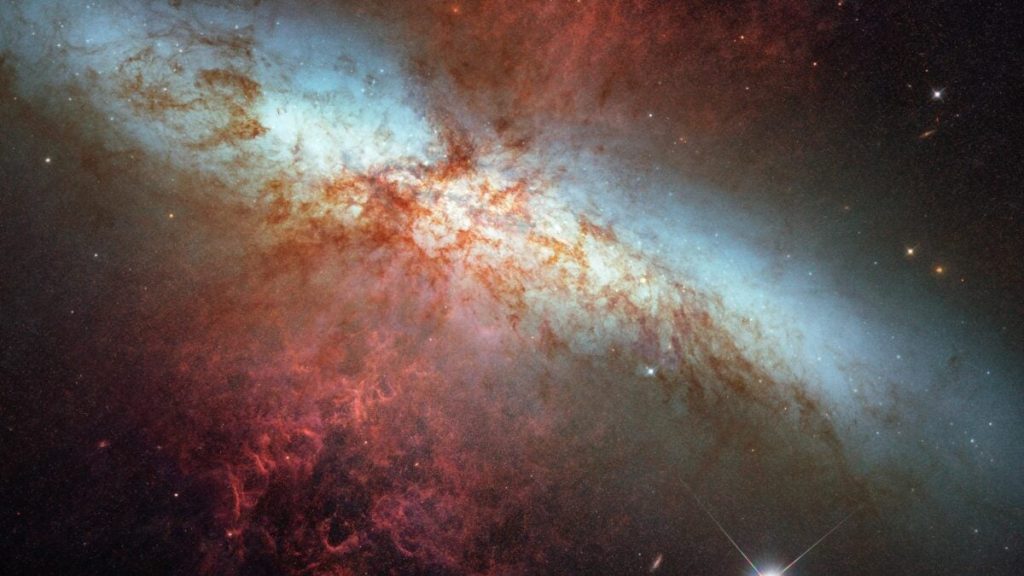After the Big Bang, our universe began to expand at an exponential rate, an acceleration scientists have long attributed to a mysterious force known as dark energy. This idea—which earned its discoverers the Nobel Prize in 2011—has largely defined our understanding of cosmic growth for decades. But new research is starting to challenge this long-held assumption.
A team of researchers has uncovered new evidence suggesting that the universe may already be slowing down, rather than continuing to speed up. The analysis, published November 5 in Monthly Notices of the Royal Astronomical Society, puts a damper on leading theories that suggest dark energy is driving the universe’s continued acceleration.
As the findings oppose the prevailing view, the paper will likely face harsh scrutiny from the cosmological community. But if true, it would add to a growing pool of evidence that suggests dark energy is changing, not constant—painting a different picture of our universe’s future. Indeed, the new research suggests that, instead of fizzling out in a “great rip,” the universe will begin to shrink in size, culminating in a “big crunch” billions of years from now.
“If our results are confirmed, it would mark a major paradigm shift in cosmology since the discovery of dark energy 27 years ago,” Young-Wook Lee, study co-lead author and an astrophysicist at Yonsei University in South Korea, told Gizmodo.
A flicker in the “standard candle”
The new analysis relies on observations of Type Ia supernovas—a distinctive class of stellar explosions whose consistent, intrinsic brightness has made them the “standard candles” for measuring galactic distances. These standard candles have helped astronomers measure the speed at which different parts of the universe move away from us.
Given their reliability, Type Ia supernovas have been a key element in the Nobel-winning calculations for dark energy. These standard candles—these supernovas—were dimmer than scientists expected, leading them to a rather startling conclusion: Galactic objects are moving faster away from Earth than was anticipated. Something is overriding the force of gravity, that something being dark energy. Hence the idea that the universe is not just expanding but expanding at an increasing rate.
However, the new findings, which include data from 300 galaxies, found a strong correlation between the standardized magnitudes of these supernovas and the age of the stars that produced them. In other words, the dimmer light of these standard candles is likely the product of their host star’s age and may not be so “standard” or consistent.
Sharpened results
Lee and colleagues first pointed to a potential age bias in a 2020 paper for The Astrophysical Journal, though the study faced criticism at the time over sample selection issues. It also sparked a brief academic exchange between Lee and Adam Riess, an astrophysicist at Johns Hopkins University and one of the Nobel laureates who described dark energy.
The new paper uses a larger dataset and takes a more measured approach; instead of pooh-poohing dark energy, it suggests the force may not be as constant as was previously believed.
The continued expansion of the universe remains the prevailing theory among cosmologists, so this team is likely to face criticism yet again. And indeed, the new results differ from more recent work by Riess and collaborators that supports continued acceleration.
This time around, however, the team is not alone in its claims. Earlier this year, independent findings from the Dark Energy Spectroscopic Instrument (DESI) suggested that dark energy—and its effect on the universe—might not be constant but instead evolving and possibly weakening over time. In the new paper, the team also corrected the data to account for its proposed bias and found that the revised data aligned nicely with the DESI results.
Fate unknown
Needless to say, knowing exactly how dark energy works is crucial for cosmologists trying to predict the fate of the universe. These predictions differ depending on how scientists interpret the shape of the universe, the supply of dark energy, and dark energy’s influence on the expansion of the universe.
For example, if the universe’s expansion keeps accelerating as per the prevailing view, the universe may max out its chaos threshold and will hover slightly above absolute zero. This “Big Freeze” would steadily blot out all known stellar processes in the universe. Alternatively, the universe’s continued expansion may cause a “Big Rip” that causes all matter to disintegrate.
These two accounts assume that dark energy accelerates the universe’s expansion. But what will happen if future investigations affirm the conclusions of DESI and the new paper, that dark energy evolves—or devolves? That would warrant a wholesale review of our cosmological models, Lee explained.
“If the universe is already decelerating, this will change the ultimate fate of the universe,” he said. “Rather than ending with a ‘Big Rip,’ a ‘Big Crunch’ is now a possibility.”
Simply put, a “Big Crunch” scenario would lead to the universe collapsing in on itself, living its final moments as a gigantic fireball burning at near-infinite temperatures. That said, the likelihood of one scenario over the other “depends on the true nature of dark energy and the exact density of the universe, for which we still do not know the answer,” Lee said.
As of now, Lee and colleagues are waiting for the next round of data from the Vera Rubin Observatory. The plan is to conduct a similar investigation with samples from 20,000 galaxies, he explained.


